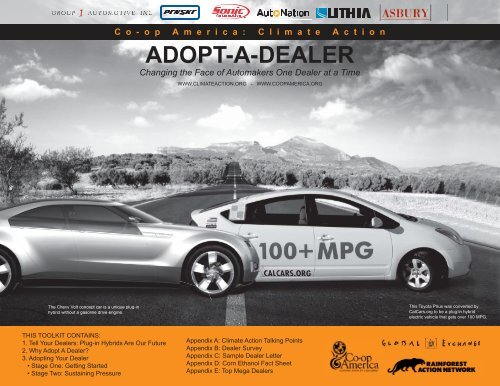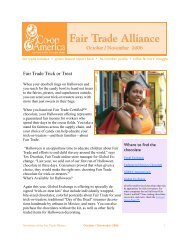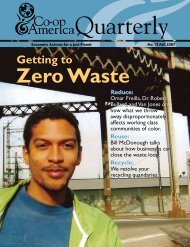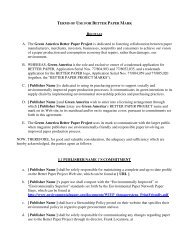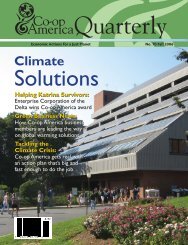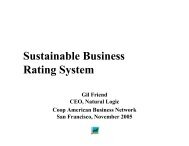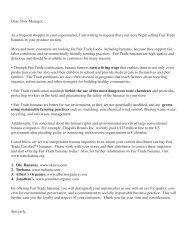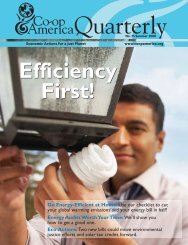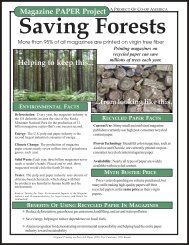ADOPT-A-DEALER - Green America
ADOPT-A-DEALER - Green America
ADOPT-A-DEALER - Green America
You also want an ePaper? Increase the reach of your titles
YUMPU automatically turns print PDFs into web optimized ePapers that Google loves.
C o - o p A m e r i c a : C l i m a t e A c t i o n<br />
<strong>ADOPT</strong>-A-<strong>DEALER</strong><br />
Changing the Face of Automakers One Dealer at a Time<br />
WWW.CLIMATEACTION.ORG - WWW.COOPAMERICA.ORG<br />
The Chevy Volt concept car is a unique plug-in<br />
hybrid without a gasoline drive engine.<br />
This Toyota Prius was converted by<br />
CalCars.org to be a plug-in hybrid<br />
electric vehicle that gets over 100 MPG.<br />
THIS TOOLKIT CONTAINS:<br />
1. Tell Your Dealers: Plug-in Hybrids Are Our Future<br />
2. Why Adopt A Dealer?<br />
3. Adopting Your Dealer<br />
• Stage One: Getting Started<br />
• Stage Two: Sustaining Pressure<br />
Appendix A: Climate Action Talking Points<br />
Appendix B: Dealer Survey<br />
Appendix C: Sample Dealer Letter<br />
Appendix D: Corn Ethanol Fact Sheet<br />
Appendix E: Top Mega Dealers<br />
Co-op <strong>America</strong>’s Adopt-A-Dealer Packet 1.
1. TELL YOUR <strong>DEALER</strong>S:<br />
PLUG-IN HYBRIDS ARE OUR FUTURE<br />
THANKS FOR JOINING THE <strong>ADOPT</strong>-A-<strong>DEALER</strong> PRO-<br />
GRAM! This is an exciting time to launch a campaign to<br />
slow global warming and break <strong>America</strong>’s oil addiction. This<br />
packet will give you everything you need to contribute to<br />
global change by working in your own community. By<br />
“Adopting a Dealer,” you can help get <strong>America</strong> on the road<br />
to energy security, a strong economy, a safe environment, improved<br />
national security and long-term sustainability.<br />
Co-op <strong>America</strong>, Global Exchange, Rainforest Action Network<br />
and many others are working together to convince the<br />
auto industry to dramatically improve fuel efficiency and<br />
eliminate vehicle greenhouse gas emissions. The single biggest<br />
step towards breaking our oil addiction is for the automobile<br />
industry to produce cleaner, more fuel-efficient cars.<br />
The technology exists today to make cars that go much farther<br />
on a gallon of gas, and it’s time for the automakers to<br />
put those cars on the road.<br />
The Adopt-a-Dealer program is a joint project that makes it<br />
easy for anyone to be a part of the solution. Auto dealers are<br />
an important link in the chain of oil addiction and global<br />
warming for two key reasons. First, they have influence over<br />
the auto executives in Detroit. Second, it’s in the dealers’ best<br />
interest for the automakers to send them more fuel-efficient<br />
vehicles, so they aren’t stuck with gas-guzzlers sitting unsold<br />
on their lots.<br />
Imagine if dealers could sell plug-in hybrid electric vehicles<br />
(PHEVs) instead of Hummers! As compared to the 12-mpg<br />
Hummer, today’s PHEVs can get more than 100 miles per<br />
gallon. They can even drive as far as 40 miles without consuming<br />
a single drop of gasoline. Instead of producing these<br />
ultra fuel-efficient vehicles, the automakers are promoting<br />
half measures and false solutions. They are avoiding increases<br />
in fuel economy and instead producing more “flex-fuel” vehicles,<br />
which are designed to run on gasoline or ethanol. Producing<br />
a gallon of corn ethanol uses almost a gallon of fossil<br />
fuel. Since the U.S. derives about 97 percent of its ethanol<br />
from corn, flex-fuel vehicles that rely on ethanol are not a<br />
viable option for emission-free vehicles. Check out our fact<br />
sheet in Appendix D to learn more about corn ethanol.<br />
OIL ADDICTION AND CLIMATE CHANGE ARE AMONG<br />
THE GREATEST THREATS WE FACE IN THE 21ST<br />
CENTURY. We have a strong history of <strong>America</strong>n innovation<br />
and the motivation to challenge the status quo. We can<br />
work together to get auto dealers on board to speak up for<br />
their and our best interests. We thank you for joining us in<br />
an ambitious campaign to bring about an ecological U-turn<br />
in the auto industry. Let’s get on the road to recovery!<br />
12 MPG VS 100 MPG<br />
Co-op <strong>America</strong>’s Adopt-A-Dealer Packet 2.
2. WHY <strong>ADOPT</strong> A <strong>DEALER</strong>?<br />
<strong>DEALER</strong>S ARE THE KEY.<br />
Dealerships exist as the retail face of automakers. Without<br />
them, the automakers can’t sell their vehicles. The dealers help<br />
the manufacturers track consumer interests. When dealers complain,<br />
manufacturers listen. And who do the dealers listen to?<br />
Us, their customers, of course!<br />
The Adopt-a-Dealer program is an innovative way for anyone<br />
and everyone to get involved in the movement to motivate<br />
automakers to be a part of the solution instead of the problem.<br />
Dealers are in a unique position to tell the manufacturers<br />
that producing the most fuel-efficient cars possible is good for<br />
<strong>America</strong> and good for business. So, let’s get to it and let dealers<br />
and automakers know that consumers are clamoring for the<br />
most efficient vehicles.<br />
NOW IS THE TIME TO GET<br />
<strong>DEALER</strong>S WORKING WITH US.<br />
Due to current uncertainty and upheavals in the U.S. auto industry,<br />
dealers are seeing issues of oil independence and fuel<br />
efficiency not just as moral issues, but as essential to their own<br />
survival!<br />
WHAT’S A MEGA <strong>DEALER</strong>?<br />
While many auto dealerships have traditionally been familyowned,<br />
there is a growing trend towards consolidation in the<br />
industry. In fact, these mega dealers own dozens and sometimes<br />
hundreds of dealerships across the country. Consequently automakers<br />
listen very closely to them.<br />
Since these mega dealers have multiple locations, people nationwide<br />
can strategically organize around the same dealership<br />
chain and work together to be very effective! We have<br />
good research on these companies and can help you find a local<br />
mega dealer.<br />
The top mega dealers in the U.S. are Auto Nation (with 257<br />
dealerships), Penske (with 178 dealerships), Group 1 (with<br />
105 dealerships), Sonic Automotive (with 149 dealerships),<br />
Lithia (with 104 dealerships), and Ashbury (87 dealerships).<br />
See Appendix E for more dealer information. AutoNation is<br />
already on board, so now it’s time to focus on Penske Automotive<br />
Group (PAG), formerly called United Auto Group. They<br />
are the world’s second largest dealership group, with 311 retail<br />
franchises, primarily in the United States, Puerto Rico and the<br />
United Kingdom. Penske’s crown jewel is Longo Toyota; located<br />
in El Monte, California. Longo has held the title of largest<br />
Toyota dealership in the United States since 1967.<br />
If community members across the United States and Canada<br />
start a dialogue with the manager of their local Penske dealership,<br />
we can convince the company’s CEO to publicly support<br />
dramatic and immediate improvements in fuel economy. The<br />
key is to ask that the local manager communicate his or her<br />
support for fuel economy back to the Penske corporate headquarters<br />
in Bloomfield, Michigan. If enough local managers do<br />
the same, we can convince the CEO to relay the same message<br />
on to the major automakers in Detroit.<br />
MEGA <strong>DEALER</strong>S HAVE POWER.<br />
Now that we’ve won support from AutoNation, the biggest<br />
corporate dealership group in the U.S., it’s time to focus our<br />
energies on the other Mega Dealers.<br />
All dealers are important, whether they are affiliated with a<br />
mega dealer or locally owned and operated. Read on to find out<br />
how to tailor your strategy to your community’s situation.<br />
The U.S. auto industry is caught in a downward spiral of oil<br />
addiction that is devastating the sector’s economic future. In<br />
recent years, credit rating agencies, banks and the stock market<br />
have all attributed Detroit’s poor economic performance<br />
to its over-reliance on gas-guzzling cars,<br />
trucks and SUVs. But, while <strong>America</strong>n<br />
consumers flock to more fuel-efficient<br />
brands in the face of sky-rocketing gas<br />
prices, the car manufacturers are deflecting<br />
the consequences of poor planning<br />
onto their workforce and dealer network.<br />
In fact, several automakers have<br />
publicly stated that they plan to downsize<br />
their dealer base. Many dealers are becoming<br />
more vocal than ever about what the<br />
industry needs to do to turn itself around.<br />
We know it; analysts know it; and dealers<br />
are starting to agree – the only “way forward”<br />
is through innovation that prioritizes<br />
increasing fuel economy.<br />
THERE IS A HISTORY OF <strong>DEALER</strong>S SPEAKING UP AND HAVING A BIG IMPACT.<br />
One brave dealer, Adam Lee, president of Lee Automalls in Maine—one of the state’s top dealers—has<br />
boldly spoken out in favor of fuel efficiency in the auto industry:<br />
“These cars that Detroit bets their future on, and my future, are not selling. [Automakers] need a notso-gentle<br />
nudge in the right direction of producing cleaner cars. I am afraid that if they don’t pick up<br />
the pace not only will global warming continue to get much worse, I will be stuck with a lot full of<br />
cars that no one will buy; or even worse: This country will no longer have a domestic car industry.”<br />
In May 2006, after months of grassroots organizing at dealerships, AutoNation (the largest corporate owner of dealerships<br />
in the U.S.) became the first major car dealer to support the campaign and call on the automakers to make ultra fuel-efficient<br />
PHEVs. CEO Mike Jackson called the PHEV “a vehicle that I believe the <strong>America</strong>n consumer will not just consider,<br />
but buy. We look forward to selling it.” Jackson continues to be a vocal advocate for fuel efficiency. This campaign victory<br />
garnered significant national media attention, and stirred things up throughout the whole auto industry.<br />
Adopt-a-Dealer can move even more dealers to support viable options to improve fuel economy and reduce greenhouse-gas<br />
emissions. In the coming year, we will continue to focus on this strategy as a catalyst for change in the U.S. auto industry.<br />
Co-op <strong>America</strong>’s Adopt-A-Dealer Packet 3.
3. <strong>ADOPT</strong>ING YOUR <strong>DEALER</strong><br />
Here are the steps you can take to enlist<br />
dealers in the effort to break our oil addiction.<br />
GETTING STARTED<br />
1First, locate the dealership in your area that you want to<br />
adopt. Your first priority should be a mega dealer — but if<br />
there is no mega dealer in your area, that’s OK — read on<br />
to find out how to approach your locally owned dealership.<br />
To find out if there is a Penske mega dealer in your neighborhood,<br />
go to: www.penskeautomotive.com.<br />
If Penske isn’t in your region, check out Sonic Automotive:<br />
www.sonicautomotive.com or Group 1 www.group1dealers.<br />
com listings for other mega dealer locations.<br />
Can’t find any mega dealers near by? Then just check your local<br />
phonebook for the largest locally owned dealership near you.<br />
(Note: Since AutoNation has already signed on in support of<br />
our campaign, there’s no need to adopt their dealerships.)<br />
2Contact Co-op <strong>America</strong> at aad@coopamerica.org or<br />
202-872-5302 and let us know which dealership you<br />
have chosen to adopt. This is important because we want<br />
to coordinate our efforts. We will connect you with other people<br />
in your area who have identified the same dealership or, if their<br />
effort is already well under way, suggest another dealership.<br />
3Once you have selected a dealership, you should ORGA-<br />
NIZE WITH OTHER COMMUNITY MEMBERS who are interested<br />
in joining you. Anyone can participate — your coworkers,<br />
family members, friends and neighbors. Seek out local<br />
student, environmental or peace groups that are already concerned<br />
about the impacts of our oil addiction. While it is always helpful<br />
to organize large numbers of people, a small group can<br />
also have amazing persuasive power in this situation – even just<br />
one person.<br />
4After forming a core group of participants, SCHEDULE<br />
A MEETING WITH THE MANAGER OR OWNER OF THE<br />
<strong>DEALER</strong>SHIP YOU HAVE <strong>ADOPT</strong>ED. Be careful not to<br />
make the dealer feel like the meeting is going to be an attack.<br />
This is simply a discussion between community members and<br />
the dealer regarding what vehicles the community would prefer<br />
to see available. You can use our survey (Appendix B) to facilitate<br />
the first conversation.<br />
5THE AGENDA FOR THE MEETING SHOULD BE CARE-<br />
FULLY PLANNED. You should start out the meeting with<br />
the following:<br />
• Introduction: Who you are & affiliation<br />
• Why are you at the dealership? (Appendix A)<br />
• Have dealer answer dealer survey questions (Appendix B)<br />
• Review and share dealer letter (Appendix C)<br />
• WRAP UP: “We hope you can join us in being a part of the<br />
solution. If you support reducing greenhouse gas emissions<br />
then consumers like me will come to you to purchase fuel<br />
efficient plug-in hybrid electric vehicles.”<br />
The pitch should be clear and concise. Remember that the dealers<br />
are not the enemy. You want to be firm in your demands<br />
(see below), while always staying friendly in your demeanor. The<br />
idea is to be hard on the issues, but soft on the people.<br />
Also, keep in mind that dealers will treat you as if you represent<br />
their next car sale. For that reason, place a lot of emphasis on<br />
helping the dealer help themselves by having more fuel-efficient<br />
vehicles on their lot.<br />
We would like each manager of a mega dealership franchise to<br />
agree to send a letter to corporate headquarters asking the company<br />
to:<br />
• Publicly support raising fuel efficiency standards to 40 miles<br />
per gallon by 2012 and 55 miles per gallon by 2020.<br />
• Set a goal for increasing the fuel economy of all the vehicles<br />
that dealership sells, excluding gains attributed to “flex-fuel”<br />
vehicles that can run on carbon-intensive ethanol.<br />
• Make a public statement highlighting the need for the U.S.<br />
auto industry to increase fuel economy immediately by producing<br />
and selling hybrid, plug-in hybrid and electric vehicles.<br />
• Set targets for increasing the percentage of hybrid vehicles<br />
sold and commit to selling plug-in hybrid and electric vehicles<br />
when available.<br />
• Join Plug-in Partners, a national grassroots campaign aimed<br />
at demonstrating that there is a market for plug-in hybrid<br />
vehicles. www.pluginpartners.org<br />
• Accept “soft orders” for plug-in hybrid vehicles.<br />
NO MEGA <strong>DEALER</strong> NEAR YOU? NO PROBLEM!<br />
HERE’S HOW TO APPROACH A LOCALLY OWNED<br />
AND OPERATED <strong>DEALER</strong>:<br />
In these days of mega-dealers and consolidations, you have a<br />
unique opportunity to position yourself as a friend and ally to<br />
the local dealership. First, be sure to do some research. For example,<br />
review their public materials, website or customer newsletter.<br />
There is no better way to tell your story than by saying<br />
encouraging things to the dealers. Be candid and confident in<br />
asking for their support.<br />
Ask the owner of your local dealership to do the same things<br />
as we are requesting of the mega-dealers, and then add some<br />
home-town flavor to it:<br />
• Write an editorial in the local newspaper to publicly support<br />
the viability of, the demand for, and the immediate need to<br />
raise fuel efficiency standards to 40 miles per gallon by 2012<br />
and 55 miles per gallon by 2020.<br />
Co-op <strong>America</strong>’s Adopt-A-Dealer Packet 4.
• Send letters to their manufacturers asking them<br />
to build more fuel-efficient vehicles and support<br />
consumer demand for putting plug-in<br />
hybrid vehicles on the road. (See Sample letter<br />
in Appendix C).<br />
6GIVE IT SOME TIME. Leave the dealer<br />
with any information you think<br />
might be helpful, for example on the<br />
negative impacts of gas-guzzling vehicles. Offer<br />
the dealer two weeks to make a decision.<br />
Make clear that you expect a response and that<br />
you will be back to hear their decision.<br />
7IF THE <strong>DEALER</strong> DECIDES TO SUPPORT<br />
THESE DEMANDS, YOU’VE SCORED A VICTO-<br />
RY! Make sure to organize a thank-you effort to express<br />
your appreciation for the dealer’s assistance. At the same time,<br />
make sure that your victory gets recognition in the community<br />
and the media. Send notice back to Co-op <strong>America</strong> where we<br />
are compiling all the successes. (We also have suggestions for<br />
further steps dealers can take to support these issues – contact<br />
us at 1-800-58-GREEN or aad@coopamerica.org for further<br />
info.)-<br />
8IF THE <strong>DEALER</strong> DECIDES NOT TO SIGN THE LETTER,<br />
FURTHER ACTION MAY BE IN ORDER. Although the<br />
dealer is not actually working for the automakers, the<br />
dealership is enabling <strong>America</strong>’s oil addiction by selling the company’s<br />
vehicles. Sometimes you may simply choose to organize<br />
at another local dealership, or you may choose to get creative<br />
and find ways to escalate the pressure.<br />
SUSTAINED PRESSURE<br />
In some situations, dealers may already be familiar with these<br />
issues and may be ready to sign the letter to automakers right<br />
there on the spot. But sometimes it may take a bigger effort and<br />
a sustained community campaign. This can be accomplished<br />
in many ways, including repeatedly scheduling meetings with<br />
the dealership, talking to sales agents on a regular basis, hosting<br />
community meetings, flyering at the dealership, or holding<br />
demonstrations and protests.<br />
The idea is to keep the pressure on the dealer until he or she<br />
decides to do the right thing. Every time you organize an event,<br />
make sure a delegation of community mem bers goes inside the<br />
dealership to keep the dialogue going. You<br />
want to let the dealer know that the community<br />
pressure will end as soon as the<br />
dealer agrees to send the letter to the automakers.<br />
HERE ARE SOME IDEAS TO<br />
CONTINUE WORKING WITH<br />
YOUR LOCAL <strong>DEALER</strong>SHIP:<br />
• Mobilize your community to make<br />
regular visits to your local dealership<br />
• Ask sales agents why they don’t carry<br />
more fuel-efficient cars.<br />
• Hand out flyers to customers, urging<br />
them to tell the dealer that they want cleaner,<br />
more fuel-efficient cars.<br />
• Continually schedule meetings with the General Manager<br />
or Sales Manager.<br />
• Deliver a petition to the dealer demonstrating community<br />
concern about the limitation of of their product line.<br />
• Present the dealer with the list of other dealers who have already<br />
joined the campaign, so they understand they wouldn’t<br />
be alone in voicing their concern.<br />
• Work with local organizations to sign letters to local dealers.<br />
Think about school boards, city councils, health organizations,<br />
student clubs, etc.<br />
• Write letters to local newspapers, websites, and blogs expressing<br />
concern about fuel efficiency.<br />
• Organize an Oil Addicts Anonymous (OAA) meeting or<br />
teach-in at your church, school, or community center about<br />
sustainable transportation, climate change, the pros and cons<br />
of alternative fuels and supporting solutions like plug-in hybrid<br />
vehicles.<br />
• Start a petition to get local dealers to join Plug-in Partners.<br />
• Work on a local Transportation Challenge Campaign.<br />
• Start an Oil Enforcement Agency (OEA) group and join the<br />
theatrical arm of our campaign. The mission of OEA is to<br />
enforce the President’s mandate to end our oil addiction by<br />
working to bring “to justice” those organizations and individuals<br />
involved in oil-addiction-fostering activities; and to<br />
recommend and support programs aimed at reducing dependence<br />
on oil and other fossil fuels. OEA is a great tool to use<br />
for fun actions at dealerships. You can download a toolkit at<br />
www.oilenforcementagency.org<br />
Let us know about your progress – and don’t hesitate to<br />
contact us with questions or ideas! We can provide you<br />
with fact sheets, fl yers, handouts, and further ideas for action!<br />
Visit the campaign at www.climateaction.org to get the<br />
Transportation Challenge, Oil Addicts Anonymous, and Oil<br />
Enforcement Agency materials. Call Co-op <strong>America</strong> at<br />
1-800-58-GREEN anytime or email aad@coopamerica.org .<br />
Co-op <strong>America</strong>’s Adopt-A-Dealer Packet 5.
APPENDIX A<br />
MEGA <strong>DEALER</strong> TALKING POINTS<br />
WHY <strong>DEALER</strong>S?<br />
Dealers are in a unique position to tell manufacturers that<br />
producing the most fuel-efficient cars possible is good for<br />
<strong>America</strong> and good for business.<br />
WE CAN DO BETTER<br />
The technology already exists to make our cars go much<br />
further on a gallon of gas, but automakers lack the will to<br />
use it. A clean energy future will mean more jobs, a cleaner<br />
environment, and improved national security because we<br />
will no longer be at the whim of oil-exporting regimes.<br />
THE TECHNOLOGY ALREADY EXISTS<br />
A recent study by the Union of Concerned Scientists<br />
showed that the technology already exists to raise fuel<br />
economy to 40 miles per gallon. Automakers need to prioritize<br />
fuel economy – not bigger, heavier, faster trucks.<br />
AUTOMAKERS TALK GREEN<br />
BUT DON’T ACT GREEN<br />
Despite spending millions on marketing campaigns<br />
painting themselves as “green”, automakers are making<br />
less fuel-efficient cars now than they did a decade ago.<br />
<strong>Green</strong>house-gas emissions are growing, and automakers<br />
are spending millions on lobbying against federal fuel-efficiency<br />
increases and filing lawsuits preventing progress.<br />
Real environmental leaders lead; they don’t deceive.<br />
BY FAILING TO INNOVATE, AUTOMAKERS<br />
ARE PLACING JOBS AT RISK<br />
By failing to innovate, automakers are placing the livelihoods<br />
of unionized <strong>America</strong>n autoworkers at risk, as<br />
foreign auto companies continue to drive technological<br />
circles around <strong>America</strong>n companies. A recent University<br />
of Michigan study found that increases in fuel economy<br />
would lead to a more secure economy and would safeguard<br />
union jobs.<br />
ARE YOUR DEMANDS FAIR?<br />
With off-the-shelf technologies available today, we could<br />
increase average fuel efficiency to 40 mpg. If we converted<br />
the entire fleet of new vehicles to gasoline-electric hybrid<br />
vehi cles, we could give consumers 60 mpg. Plug-in hybrid<br />
electric vehicles can give us more than 100 miles per gallon<br />
today. Not only are these demands fair and reasonable,<br />
but they are the steps that must be taken to begin ending<br />
our addiction to oil.<br />
CORN ETHANOL IS NOT THE SOLUTION<br />
Automakers like Ford and GM are exploiting a biofuels<br />
loophole in fuel economy regulations to avoid reducing<br />
gasoline consumption and tailpipe greenhouse-gas<br />
(GHG) emissions. See Appendix D for a full explanation<br />
of the problem with corn ethanol.<br />
VOICES OF SUPPORT:<br />
“Even the Big Three now acknowledge that high gas prices and their overdependence<br />
on fuel-ineffi cient SUVs and pickup trucks have accelerated their fi nancial freefall. The<br />
fi ndings of our report prove in sharp detail Detroit automakers’ long-term vulnerability to<br />
volatile gas prices and show that improved fuel economy fl eetwide — above and beyond<br />
current regulation — is the key not just to their survival but their success, even if the price<br />
of gas goes down.”<br />
– Walter McManus, Director of the Offi ce for the Study of Automotive Transportation,<br />
University of Michigan<br />
“More than half of <strong>America</strong>ns now say they would consider a gasoline-electric hybrid for<br />
their next vehicle purchase.”<br />
– J.D. Power and Associates’ 2006 Alternative Powertrain Study<br />
Co-op <strong>America</strong>’s Adopt-A-Dealer Packet 6.
APPENDIX B<br />
<strong>DEALER</strong> SURVEY<br />
The Adopt-a-Dealer program is building consumer awareness<br />
of their transportation options by being a part of the solution<br />
to break our oil addiction and avert the global climate crisis.<br />
With the fluctuation of high gas prices and over-consumption<br />
of fossil fuels, automakers and dealers can become even more<br />
competitive in the global marketplace by investing in existing<br />
technology to build more fuel-efficient vehicles.<br />
More than half of <strong>America</strong>ns now say they would consider a gasoline-electric<br />
hybrid for their next vehicle purchase.<br />
–J.D. Power and Associates’<br />
2006 Alternative Powertrain Study.<br />
Please complete the survey below to support us in our effort<br />
towards solutions to oil consumption and climate change.<br />
Thank You.<br />
(Scale: low/less = 1 to high/more = 5)<br />
1. Rate how the drop of U.S. car sales is affecting your<br />
company profits.<br />
° ° ° ° °<br />
1 2 3 4 5<br />
2. How significant is fuel economy to your customers?<br />
° ° ° ° °<br />
1 2 3 4 5<br />
3. Please rate your awareness of issues of climate change.<br />
° ° ° ° °<br />
1 2 3 4 5<br />
5. Please rate how important access to clean, fuel-efficient<br />
vehicles is to the success of your business.<br />
° ° ° ° °<br />
1 2 3 4 5<br />
6. Are you in favor of the state of California emission<br />
standards? If you are not in California, do you think they<br />
should be applied to your state?<br />
° ° Yes No<br />
7. Do you think the Big Three would compete better with<br />
Toyota, Honda and others if they made more fuel -<br />
efficient vehicles?<br />
° °<br />
Yes No<br />
8. Do you think United Auto Workers would benefit from<br />
automakers building more fuel-efficient cars?<br />
° °<br />
Yes No<br />
9. If automakers made plug-in hybrid electric vehicles would<br />
your dealership sell these vehicles?<br />
° ° Yes No<br />
10. Would you recommend to automakers to build more<br />
fuel efficient vehicles? Why, or why not?<br />
11. Are the cars your customers want to buy available to<br />
you? What is the greatest purchasing trend?<br />
12. Does your dealership purchase hybrid vehicles? Why, or<br />
why not?<br />
13. Do you consider your dealership a leader in fuel<br />
efficiency?<br />
Please share any additional comments or suggestions.<br />
4. Please rate your relationship with the automakers.<br />
° ° ° ° °<br />
1 2 3 4 5<br />
Co-op <strong>America</strong>’s Adopt-A-Dealer Packet 7.
{Date}<br />
Contact: {YOUR NAME, GROUP NAME}<br />
Dear {<strong>DEALER</strong> NAME},<br />
We are here today as part of a global campaign to improve the fuel efficiency and curb the greenhouse gas<br />
emissions of the auto industry. Please understand that our efforts are not aimed at you or your dealership, but<br />
rather at the actions of the major U.S. automobile manufacturers.<br />
With our troops in harm’s way and the climate crisis already affecting our lives, we’re calling on auto manufacturers<br />
to demonstrate true leadership in increasing the fuel economy of our vehicles immediately. Fuel efficiency is not<br />
just a moral issue; the long-term financial success of both your dealership and the U.S. auto industry as a whole<br />
relies on the manufacturers’ ability to meet consumer demand for fuel-efficient vehicles.<br />
The good news is that we have the technology and the dedication to break the oil addiction and stop driving the<br />
planet toward climate chaos. Customers are clamoring to drive plug-in hybrid electric vehicles (PHEVs). We<br />
have the solutions, but we urgently need the auto companies to implement them. Even without support from<br />
the automakers or the government, PHEVs are already getting over 100 mpg. Imagine how efficient they could<br />
be if mass-produced. And imagine how good you would feel about selling plug-in hybrids vehicles instead of<br />
Hummers!<br />
As a dealer, you have a powerful voice. The automakers need to know that the time for addressing global<br />
warming through half measures like flex-fuel vehicles and concept cars has passed, and that you want to sell the<br />
most viable technical solution to reduce greenhouse-gas emissions and curb oil consumption. Please consider<br />
joining with millions of concerned consumers, AutoNation (the largest dealership group in the country),<br />
independent dealer Adam Lee of Maine, and many others to send the resounding message that the health of<br />
our planet, the security of our country, and the vitality of the auto industry rest upon the decisions that the<br />
auto industry makes now.<br />
This is why we are asking you to send a letter to your CEO, {ADD NAME} asking {him or her} to: {see<br />
appendix E, for CEO name}<br />
• Publicly support raising fuel efficiency standards to 40 miles per gallon by 2012 and 55 miles per gallon by<br />
2020.<br />
• Set a goal for increasing the fuel economy of all the vehicles that your dealership group sells, excluding gains<br />
provided by flex-fuel vehicles run on carbon-intensive ethanol.<br />
• Make a public statement highlighting the need for action from the U.S. auto industry to immediately<br />
increase fuel economy by producing and selling hybrid, plug-in hybrid and electric vehicles.<br />
• Set targets for increasing the percentage of hybrid vehicles sold and commit to selling plug-in hybrid and<br />
electric vehicles when available.<br />
• Join Plug-in Partners, a national grassroots campaign aimed at demonstrating that there is a market for plugin<br />
hybrid vehicles. www.pluginpartners.org<br />
• Accept soft orders for plug-in hybrid vehicles.<br />
Thank you for your attention on this important matter.<br />
I look forward to your response.<br />
Sincerely,<br />
APPENDIX C<br />
SAMPLE <strong>DEALER</strong> LETTER<br />
This is a letter that you can deliver to the manager or owner when<br />
you visit the dealership. Ask the dealer to send a similar letter<br />
to their company CEO. You should consider taking the time to<br />
personalize this message to your dealer.<br />
Josh Russell, Rainforest Action<br />
Network (RAN) with Ford dealer<br />
who joined on the campaign.<br />
Co-op <strong>America</strong>’s Adopt-A-Dealer Packet 8.
APPENDIX D<br />
CORN ETHANOL:<br />
Polluting Our Climate And Squeezing Our Farmers<br />
GET THE FACTS STRAIGHT: Corn ethanol cannot cure our oil addiction.<br />
Learn why it is not an option by debunking fi ve commonly held misconceptions.<br />
been able to stabilize the price with subsidies. With Mexico’s<br />
poorest receiving 40 percent of their nutrition from corn<br />
tortillas, children and families alike are suffering from rising<br />
corn prices due to an increase in ethanol production. 8<br />
• Farmers and consumers in Guatemala have already been hit<br />
by an increase in corn prices of 30 percent in the last year. 9<br />
• With increasing corn prices, U.S. consumers may see rising<br />
costs not only in corn, but in all products which depend on<br />
corn as feed or include high-fructose corn syrup.<br />
MISCONCEPTION 1:<br />
CORN ETHANOL IS MORE ENERGY<br />
EFFICIENT THAN GASOLINE<br />
• Corn crops are treated with larger quantities of toxic<br />
pesticides and fertilizers than any other U.S. food crop. 1<br />
• The process of converting corn to ethanol consumes a<br />
significant amount of energy and electricity. The plants used<br />
in this conversion process are predominantly coal-powered,<br />
which results in a large amount of harmful carbon emissions.<br />
• When accounting for the energy needed to cultivate corn<br />
and then ferment the starches into an alcoholic fuel, corn<br />
ethanol requires almost a gallon of fossil fuel for every gallon<br />
of ethanol.<br />
MISCONCEPTION 2:<br />
CORN ETHANOL IS A CLEAN SOLUTION TO<br />
CLIMATE CHANGE<br />
• When comparing CO 2<br />
emissions,<br />
corn ethanol results in only a 12 percent<br />
reduction in life-cycle emissions over<br />
gasoline, just 11 percent with E-85 2 (a<br />
mixture made up of 85 percent ethanol<br />
and 15 percent gasoline) and almost no<br />
reduction if you factor in the carbon<br />
emitted from coal-powered plants<br />
during ethanol production. 3<br />
• The large amount of chemicals<br />
required to cultivate corn<br />
results in a great deal of<br />
nitrate run-off, which<br />
pollutes water sources and<br />
can cause birth defects and<br />
other health problems.<br />
MISCONCEPTION 3:<br />
CORN ETHANOL CAN HELP THE U.S. FIGHT ITS<br />
DEPENDENCY ON FOREIGN OIL<br />
• Currently, ethanol production is equal to only about 1.5 percent<br />
of U.S. oil imports. According to the United States Department<br />
of Agriculture, energy provided from U.S. ethanol<br />
will stagnate at around 3.7 percent of oil imports by 2017. 4<br />
• Replacing the U.S.’s yearly use of 200 billion gallons of fuel<br />
with corn ethanol would require 675 million acres. That<br />
would require three-quarters of our current farmland to be<br />
devoted solely to the cultivation of corn for ethanol. 3<br />
• In all, reducing our oil dependency through corn ethanol<br />
isn’t even remotely feasible because of the vast amounts of<br />
farmland and resources it would require.<br />
MISCONCEPTION 4:<br />
CORN ETHANOL SUPPORTS SMALL FARMERS BY<br />
INCREASING DEMAND FOR CORN<br />
• In 2000, about 80 percent of ethanol plants were farmer<br />
owned. As of 2006, only 20 percent of all current and future<br />
ethanol plants are farmer owned, with large-scale agribusinesses<br />
accounting for the majority. 6<br />
• Therefore, the increasing U.S. corn prices will continue to<br />
benefit large agribusinesses and actually hurt small farmers<br />
who depend on corn for animal feed. For example, dairy<br />
farmers have already experienced a 25 percent rise in feed<br />
costs.<br />
• Internationally, the U.S. accounts for 70 percent of the<br />
world’s corn exports, and rising prices are on their way to<br />
creating a global food crisis among countries that import<br />
U.S. corn for food. 7<br />
• In Mexico, the price of corn tortillas, a food staple, has<br />
increased to three to four times their 2006 price. As a result<br />
of trade policies including the North <strong>America</strong>n Free Trade<br />
Agreement (NAFTA), the Mexican government has not<br />
MISCONCEPTION 5:<br />
CORN ETHANOL IS THE BEST CHOICE WE<br />
CURRENTLY HAVE<br />
There are several other alternative energy choices that are vastly<br />
more beneficial and efficient than corn ethanol:<br />
• Cellulosic ethanol is a better ethanol choice as it is primarily<br />
produced from industrial waste (like paper pulp) and plant<br />
waste (like corn stalks). It takes far less energy to produce<br />
than corn ethanol and results in an 87 percent carbon<br />
emissions reduction over gasoline. 10<br />
• Biodiesel made from any organic oil is biodegradable,<br />
non-toxic and can be converted into fuel to reduce vehicle<br />
emissions by 52 percent compared to gasoline. 11<br />
• Gas-electric hybrids are around 20-35 percent more efficient<br />
than gasoline cars and emit about 30 percent less CO2 ,<br />
achieving up to 60 miles per gallon.<br />
• Electric and plug-in hybrid electric vehicles (PHEVs) that<br />
are plugged into green energy sources are pollutant and<br />
emission-free. Even when powered by dirty electricity<br />
sources, they emit less greenhouse gas than a traditional car.<br />
These vehicles have rechargeable batteries and have achieved<br />
more than 100 miles per gallon. The gasoline engine in the<br />
hybrid kicks in only once the battery is drained and therefore<br />
reduces greenhouse gas emissions by 30-42 percent. 12<br />
PHEVs are also more cost efficient, running on around 75<br />
cents per gallon. 13 And it is possible now: the U.S. electrical<br />
grid has the capacity to power the daily commutes of 73<br />
percent of our light-duty passenger vehicles, and by charging<br />
them at night, we could switch millions more trucks, vans,<br />
and SUVs to PHEVs tomorrow without building a single<br />
power plant. 14 Plug-in hybrids are our best transportation<br />
option, and we want to see them on the road tomorrow!<br />
Learn more about corn ethanol in the Co-op <strong>America</strong> Quarterly:<br />
www.coopamerica.org/go/ethanol.<br />
Co-op <strong>America</strong>’s Adopt-A-Dealer Packet 9.
1. Pollan, Michael. “When a Crop Becomes King.” The New York<br />
Times. July 19, 2002.<br />
2. Tilman, David; Hill , Jason; Nelson, Erik; Polasky, Stephen and<br />
Tiffany, Douglas. “Environmental, economic, and energetic costs<br />
and benefits of biodiesel and ethanol biofuels.” Proceedings of the<br />
National Academy of Science 103 (30): 11206.<br />
3. Farrell, Alexander; Plevin, Richard; Turner, Brian; Jones, Andrew;<br />
O’Hare, Michael and Kammen1 Daniel. “Ethanol Can Contribute<br />
to Energy and Environmental Goals.” Science. January 27, 2006:<br />
506-508.<br />
4. Collins, Keith. “U.S. Agriculture and the Emerging Bioeconomy.”<br />
U.S.D.A. Presentation. Oct 2006.<br />
5. Allen, Mike. “Crunching the Numbers on Alternative Fuels.” Popular<br />
Mechanics. May 2006.<br />
6. Steil, Mark. “New money changes ethanol industry.” Minnesota<br />
Public Radio. February 9, 2006. Quoting David Morris, The Institute<br />
for Local Self Reliance.<br />
7. Brown, Lester. “Distillery Demand For Grain To Fuel Cars Vastly<br />
Understated: World May Be Facing Highest Grain Prices in History.”<br />
Earth Policy Institute Eco-Economy Updates. January 4,<br />
2007.<br />
8. Roid-Franzia, Manuel. “A Culinary and Cultural Staple in Crisis.”<br />
The Washington Post. Jan 27, 2007: A1.<br />
9. Rosenberrg, Mica. “High corn prices threaten Guatemalans with<br />
hunger.” Reuters. May 2, 2007. Quoting Ian Cherret, United Nations<br />
Food and Agriculture Organization.<br />
10. Wang , Michael. Argonne National Laboratory. http://www.transportation.anl.gov/pdfs/TA/345.pdf<br />
11. Tilman, David; Hill , Jason; Nelson, Erik; Polasky, Stephen and<br />
Tiffany, Douglas. “Environmental, economic, and energetic costs<br />
and benefits of biodiesel and ethanol biofuels.” Proceedings of the<br />
National Academy of Science 103 (30): 11206.<br />
12. Wang, Michael. Argonne National Laboratory. http://www.transportation.anl.gov/pdfs/TA/345.pdf<br />
13. Electric Power Research Institute. http://www.epri-reports.org/<br />
PHEV-ExecSum-vol1.pdf<br />
14. Kintner-Meyer, Michael; Schneider, Kevin and Pratt, Robert.<br />
“Impacts Assessment of Plug-in Hybrid Vehicles on Electric Utilities<br />
and Regional U.S. Power Grids.” Pacific Northwest National<br />
Laboratory. Dec 3, 2006 http://www.ferc.gov/about/com-mem/<br />
wellinghoff/5-24-07-technical-analy-wellinghoff.pdf
APPENDIX E<br />
TOP US MEGA <strong>DEALER</strong>S<br />
“Changing the Face of Automakers One Dealer at a Time”<br />
MEGA <strong>DEALER</strong> STATUS LOCATIONS HEADQUARTERS CONTACTS<br />
257 dealerships in<br />
AL, AZ, CA, CO, FL,<br />
GA, ID, IL, MD, MN,<br />
NV, NC, OH, TN, TX,<br />
VA, WA<br />
178 dealerships in<br />
AR, AK, CA, CT, FL,<br />
GA, IN, MI, MN, MS,<br />
NV, NJ, NY, OH, OK,<br />
RI, TN, TX, VA, PR<br />
149 Franchises in<br />
AL, CA, CO, FL, GA,<br />
MD, MI, NV, NC, OH,<br />
OK, SC, TN, TX, VA<br />
105 dealerships in<br />
AL, CA, FL, GA, LA,<br />
MS, MA NH, NJ, NM,<br />
NY, OK TX<br />
110 SE 6th Street,<br />
Fort Lauderdale, FL<br />
33301<br />
2555 Telegraph Rd,<br />
Bloomfi eld Hills, MI<br />
48302-0954<br />
6415 Idlewild Road,<br />
Suite 109,<br />
Charlotte, NC 28212<br />
950 Echo Lane<br />
Suite 100<br />
Houston, TX 77024<br />
CEO: Mike Jackson<br />
Ph: 954-769-6000<br />
Fax: 954-779-3884<br />
autonation.com<br />
CEO: Roger Penske<br />
Ph: 248-648-2500<br />
Fax: 248-648-2525<br />
penskeautomotive.com<br />
CEO: O. Bruton Smith<br />
Ph: 704-566-2400<br />
Fax: 704-536-4665<br />
sonicautomotive.com<br />
CEO: Earl J. Hesterberg<br />
Ph: (713) 647-5700<br />
Fax: (713) 647-5858<br />
group1auto.com<br />
# UNITS SOLD<br />
that we can ensure<br />
to be more effi cient<br />
NET<br />
REVENUE<br />
369,567 $11.2 billion<br />
228,253 $7.6 billion<br />
(based on merger<br />
of United Auto<br />
Group and Penske<br />
Automtive)<br />
160,387 $5.2 billion<br />
129,198 $3.8 billion<br />
104 dealerships in<br />
AK, CA, CO, ID, IA, MT,<br />
NE, NV, NM, ND, OR,<br />
SD, TX, WA<br />
360 E Jackson Street,<br />
Medford, OR 97501<br />
CEO: Sidney DeBoer<br />
Ph: 541-776-6899<br />
Fax: 541-774-7617<br />
lithia.com<br />
66,224 $1.8 billion<br />
87 dealerships in<br />
CA, TX, IL, MO, AK,<br />
MS, GA, FL, SC, NC,<br />
VA, NY<br />
622 3rd Ave, 37th Floor,<br />
New York, NY 10017<br />
CEO: Charles Oglesby<br />
Ph: 212-885-2500<br />
Fax: 203-356-4450<br />
asburyauto.com<br />
104,066 $3.6 billion<br />
(Based on Ward’s Auto, Megadealer top 100)<br />
Co-op <strong>America</strong>’s Adopt-A-Dealer Packet 11.


